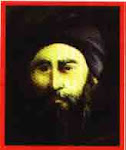Arabic: 'abū nasri muhammadi l-fārābiyy
Artistic representation of Al-Farabi. From a 200 Tenge note of Kazakhstan.
(Ca. 870-950) In Islam, the philosopher who introduced Plato and Aristotle to Muslim philosophy, introducing a system that united metaphysics and politics.
His ethnic background is not clear, most references suggest that he was of Persian origin, but there are also indicators of him being of Turkic origin.
Al-Farabi worked at the beginning of his career with the Samanid emirs.
Knowledge through intellect or symbols
For al-Farabi, God was the highest intellect, the utmost reason for all existence. Al-Farabi's idea was that the philosopher could attain truth through his own reason, but the majority of human beings would have to understand truth through symbols. Philosophers who had the ability to understand truth not only with the intellect but also with imagination, could also express truth symbolically, by this they were prophets.
Although a religion is made up of different systems of symbols presented by prophets, all symbols seek to express the same truth. But al-Farabi did not go so far as to say that all symbolic systems were of the same value.
Al-Farabi's distinction between the intellectual elite (philosophers and prophets) and the masses who only understood through symbols, soon became central in Islamic thought, linked with the system of the Ulama.
The ideal state
The other philosophical construction of al-Farabi was his idea of an ideal state, in which he was strongly influenced by Platon and his The Republic.
Al-Farabi's ideal state was a Muslim, a reflection of the state of Muhammad at Madina, when Al-Farabi claimed that the state was ruled by the guidance of God. Al-Farabi's Muslim state had as its duty to provide for the well-being of its citizens, to help them achieve religious salvation. The leader of the state should be a philosopher and have higher knowledge. If nobody in a society had these qualifications, then a group of people should govern.
Musical theory
Al-Farabi also made major works on musical theory, and is considered one of the leading at this. He developed an Arab tone system. He also wrote about the therapeutic qualities music has on the human mind.
Importance and Influence
Al-Farabi's work was of great importance Avicenna less than a century later.
History
Ca. 870: Born in Wasij, Turkestan. This corresponds to modern Kazakhstan.
Around 900: Moves to Baghdad.
940's: Moves to Damascus to work for the Hamdanid emirs.
950: Dies in Damascus.
Friday, June 12, 2009
Subscribe to:
Post Comments (Atom)











No comments:
Post a Comment